Pope Francis Said Sorry for Colonizing the Americas—Here’s What He Left Out
Pope Francis offered an unprecedented apology for the Church's role in colonizing the Americas, yet failed to directly the slave trade and many more global injustices.
Pope Francis has died at 88. His death on Easter Monday marked the end of a papacy characterized by advocacy for the poor and marginalized, a progressive stance on climate change, and a willingness to confront the dark chapters of church history.
In a historic move that sent ripples through Indigenous communities worldwide, Francis's Vatican formally repudiated the "Doctrine of Discovery" in March 2023, a decision that came after generations of Indigenous activists demanded the Church reckon with this foundational stain on its conscience. Yet this papal course correction, though significant, left crucial gaps in addressing the Church's full complicity in global colonization and the slave trade.
What Francis began represents only the first steps in a journey toward full acknowledgment of centuries of Church-sanctioned violence. The papal bulls he failed to explicitly revoke still cast long shadows over our present reality, shaping law, politics, and the ongoing dispossession of Indigenous peoples across continents. As we reflect on his legacy, we must acknowledge both his steps toward reconciliation and the unfinished business he leaves behind in confronting the Catholic Church's role in endless suffering.
From Italian Parents to "People's Pope": Francis's Progressive Legacy
Francis was history's first Latin American pontiff (though born to Italian immigrant parents), bringing a crucial Global South perspective to the institution. He delighted crowds at St. Peter's Basilica just one day before his death, capping a final Easter celebration that reinforced his image as a pope who maintained a connection with ordinary people despite his declining health.
Throughout his papacy, Francis "charmed the world with his humble style and concern for the poor but alienated conservatives with critiques of capitalism and climate change" (PBS) pushing the Church toward social justice concerns while navigating fierce resistance from traditionalists. His death, coming after a stroke and cardiac arrest, ends "an often turbulent reign in which he sought to overhaul an ancient and divided institution” (Reuters).
The Argentine-born pope showed a greater willingness than his predecessors to address historical wrongs. While Pope John Paul II had apologized for the Church's failure to speak out against the Holocaust, antisemitism, and the Inquisition back in 2000, Francis took important new steps. In Bolivia in 2015, he apologized for the Church's role in colonization and the violence committed during the conquest of the Americas. His 2022 trip to Canada featured a full apology for the Catholic Church's role in residential schools that devastated Indigenous communities.
I'm fighting to document Catholic Church acknowledgments like Pope Francis's before they're dismissed as 'liberal hysteria' or erased entirely—and I need your help!
With no corporate backing or wealthy sponsors, this work depends entirely on readers like you. If everyone reading this became a paid subscriber, I could investigate these institutional reckonings full-time, but right now less than 3% of my followers are paid subscribers.
If you believe in journalism that tracks moral accountability when others look away, please consider a paid subscription today!
How 15th Century Papal Decrees Justified Taking Continents and Enslaving Millions
Yet despite these apologies, Francis never personally and directly confronted the foundational documents that enabled these atrocities. To understand the full scope of what remained unaddressed, we need to examine the so-called "Doctrine of Discovery:" a series of 15th-century papal decrees that divided the non-European world between colonial powers and provided religious justification for conquest, enslavement, and cultural (and actual) genocide across multiple continents.
Three particular papal bulls form the foundation of this doctrine: Pope Nicholas V's Dum diversas (1452) and Romanus Pontifex (1455), and Pope Alexander VI's Inter caetera (1493). These decrees authorized colonial powers like Spain and Portugal to "seize lands and subjugate people in Africa and the 'New World,'" provided those lands were not inhabited by Christians.
In the 1452 Dum Diversas bull, Pope Nicholas V granted King Alfonso V of Portugal "full and free permission to invade, search out, capture and subjugate the Saracens and pagans and any other unbelievers and enemies of Christ wherever they may be... and to reduce their persons into perpetual slavery." This explicit authorization of enslavement based on religious identity would become the theological foundation for the transatlantic slave trade.
The 1455 Romanus Pontifex further expanded these powers, praising the Portuguese king for his "battles against the Muslims" and instructing him to "capture and subdue all Saracens, Turks, and other non-Christians." It granted Portugal dominion over lands south of Cape Bojador in Africa, with Church leaders arguing that "slavery served as a natural deterrent and Christianizing influence to 'barbarous' behavior among pagans." Pope Alexander VI's 1493 Inter Caetera bull then extended similar privileges to Spain following Columbus's voyages, granting Spanish monarchs all lands "to the west and south" of a pole-to-pole line 100 leagues west of the Azores.
The doctrine wasn't just some obscure medieval theological curiosity. It was weaponized for centuries, embedded in legal systems, and continues to shape our world today. The concept was cited as recently as 2005 in a U.S. Supreme Court decision involving the Oneida Indian Nation, written by the late Justice Ruth Bader Ginsburg. Its legacy lives on in property laws, border disputes, and the ongoing dispossession of Indigenous peoples worldwide. In Canada, the United States, Australia, and beyond, the Doctrine of Discovery remains the legal foundation for how courts approach Indigenous land rights and sovereignty claims.
For generations, Indigenous activists have demanded the Vatican formally revoke these papal bulls. As representatives from the Haudenosaunee Relations Committee stated in 2018: "An apology to Indigenous Peoples without action are just empty words. The Vatican must revoke these Papal Bulls and stand up for Indigenous Peoples for the harms done to us."
Francis's Half Measures: He Condemned Colonization But Didn't Revoke the Papal Bulls
Francis undoubtedly demonstrated more willingness than his predecessors to confront this history. His 2022 trip to Canada featured an unprecedented apology for the Catholic Church's role in the horrific residential school system that tore apart Indigenous families and communities. During this journey, he called the schools' assimilation policy a form of "genocide" and begged forgiveness for the "evil committed by so many Christians."
That pilgrimage of penance set the stage for the Vatican's formal statement on the Doctrine of Discovery in March 2023. The declaration came after decades of Indigenous activists demanding recognition of how these papal bulls had devastated their communities and shaped colonial legal systems that continue to deny their rights today.
The Vatican statement represented significant progress, acknowledging that the papal bulls failed to reflect the equal dignity and rights of Indigenous peoples. It stated these documents were manipulated by colonial powers to justify immoral acts against Indigenous communities, with the Church acknowledging that ecclesiastical authorities too often failed to oppose these atrocities. Yet Indigenous leaders noted crucial omissions. The Vatican offered no evidence that the three papal bulls had themselves been formally abrogated, rescinded or rejected, leaving intact the formal documents that authorized centuries of colonization. Instead, they issued a carefully worded statement of regret without explicitly revoking the original decrees.
Sarah Augustine, co-founder and executive director of the Coalition to Dismantle the Doctrine of Discovery, noted that while the Vatican statement was "momentous," she would "stop short of calling it a repudiation." Augustine questioned how the Vatican could claim the papal bulls were simply "manipulated for political purposes" when the original text of Inter Caetera explicitly granted conquered lands to the Spanish crown.
Mark Charles, a Navajo theologian and author, criticized the Vatican for "trying to limit" the Catholic Church's legal liability by framing past harms as perpetrated by individual bad actors instead of by church institutions. "It's not that their words and the papal bulls were being manipulated and co-opted by political entities, they were being written for political entities to justify these actions," Charles said.
Kenneth Deer, a Mohawk leader who traveled to the Vatican in 2016 as part of a delegation demanding revocation, observed that "only now in 2023 is a papacy speaking up and only because of pressure from Indigenous Peoples." Michelle Schenandoah of the Oneida Nation, who had called for the Vatican to rescind the papal bulls during Pope Francis's trip to Canada, called the Vatican statement "another step in the right direction," but noted that it didn't mention the rescinding of the bulls themselves.
While the Vatican's 2023 statement rejected the doctrine, Pope Francis himself did not personally issue an apology for it. This falls into a pattern where the Church has selectively addressed historical wrongs—apologizing for some while sidestepping others. Unlike his direct personal apology for residential schools, the repudiation of the Doctrine of Discovery came as an institutional statement that avoided full papal responsibility for its devastating global impact.
The Catholic Church's Role in Slavery That Francis Never Addressed
Perhaps the most glaring absence in Pope Francis's reckonings was a papal apology for the Church's central role in the transatlantic slave trade – a brutal commerce in human lives that would ultimately involve the forced transportation of over 12 million Africans across the Atlantic. While individual bishops and Catholic organizations have acknowledged involvement, no pope has issued a full, formal apology for the Church's active participation in and justification of slavery, including owning slaves and profiting from the trade.
Pope Nicholas V's papal bulls weren't just about land seizure. The 1452 Dum Diversas specifically authorized King Alfonso V of Portugal to "reduce any Saracens (Muslims) and pagans and any other unbelievers to perpetual slavery," directly facilitating the Portuguese slave trade from West Africa. This decree came during Europe's early maritime explorations and established a theological justification for enslavement that would shape centuries of exploitation.
The 1455 Romanus Pontifex bull was even more explicit. It legally granted Portugal the right to enslave peoples they encountered in their explorations and effectively treated sub-Saharan Africa as territory available for conquest. This bull wasn't merely a political document – it represented divine sanction for the trafficking of human beings based on religious and racial differences.
The papal edicts empowered European powers to commit atrocities on an industrial scale while claiming moral authority. When Pope Alexander VI issued Inter Caetera in 1493, it extended these privileges to Spain after Columbus's voyages, creating the theological foundation for what would become the largest forced migration in human history.
Catholic defenders often point to later papal statements condemning specific instances of slavery, but the historical record tells a more complex story: the foundational papal approvals of the African slave trade were permitted and continuously renewed by papal authorities for centuries. Pope Innocent VIII even accepted the gift of 100 slaves from Ferdinand II of Aragon in 1488 and distributed them to cardinals and Roman nobility.
The consequences were devastating. Through Transatlantic trafficking, the church systematically extended its influence while European slavers baptized millions of enslaved people whose labor built vast wealth for European powers. Religious orders like the Jesuits became major slaveholders themselves, operating plantations and ranches using enslaved labor while justifying the practice as a path to evangelization. In Brazil, the Jesuit order only divested itself of plantations and enslaved people in the 18th century.
Unlike the careful repudiation of the Doctrine of Discovery, the Church's enabling role in the transatlantic slave trade remains largely unaddressed by Francis or any modern pope, with complex historical truths often obscured by selective references to later condemnations of specific abuses. Pope Francis never issued an apology specifically for the Church's role in justifying, enabling, and profiting from the global slave trade.
What Real Reconciliation Would Look Like and Why We May Never See It
Pope Francis took important first steps in acknowledging the Church's role in colonization, but a full reckoning remains elusive. The Vatican's 2023 statement on the Doctrine of Discovery stopped short of the formal revocation Indigenous peoples have demanded for generations. Many Indigenous advocates point out that "an apology to Indigenous Peoples without action are just empty words." The Church's enabling role in the transatlantic slave trade remains largely unaddressed, with complex historical truths often obscured by selective references to later condemnations of specific abuses.
Even the Vatican's repudiation of the Doctrine of Discovery in 2023 contained misleading historical claims. Cardinal Michael Czerny characterized the doctrine as "an invention or creation of the U.S. Supreme Court in the 19th century," obscuring the Church's original role in creating the theological foundation for colonization. This tendency to minimize institutional culpability undermines genuine efforts at reconciliation
Francis's papacy did not address other critical historical wrongs that remain unaddressed by the Church. No pope has issued a formal apology for the forced conversions and missionary violence that accompanied Catholic expansion, including forced baptisms, destruction of sacred sites, and execution of those who resisted conversion. While Francis apologized for the Church's role in Canadian residential schools, a comprehensive apology for the global colonization carried out by Catholic empires—Spanish, Portuguese, and French—with explicit Church approval remains unissued.
True reconciliation requires more than carefully worded apologies. It demands a complete accounting of history, formal revocation of the papal bulls that authorized colonization and slavery, material reparations for communities harmed by these policies, and structural reforms to ensure such abuses never happen again. As Phil Fontaine, former national chief of the Assembly of First Nations in Canada stated after the Vatican's 2023 statement, "The ball is in the court of governments" to revise property laws that cite the doctrine.
Francis pushed the Church further than his predecessors in confronting this history, but the journey toward true accountability has only begun. As we reflect on his legacy, we must acknowledge both his courage in beginning this process and the unfinished work that remains. The road to reconciliation demands confronting not just individual abuses but the theological foundations that enabled systematic oppression.
The question now falls to his successor: Will the next pope continue this difficult path toward historical reckoning, or will uncomfortable truths once again be relegated to the shadows of Church history? The answer will determine not just the moral standing of the Catholic Church but our collective ability to build a more just world from the wreckage of colonial violence. The seeds Francis planted must not wither with his passing.
Looking ahead to the coming conclave, the conservative wing of the Church—which viewed Francis with suspicion and often outright hostility—is poised to potentially regain control. Leading papal candidates include Cardinals Marc Ouellet, Raymond Burke, and Robert Sarah, all of whom have expressed traditionalist views that stand in stark opposition to Francis's more progressive approach to historical accountability. A Church led by any of these figures would likely halt or even reverse the modest progress on colonization and Indigenous rights that Francis began.
Even if a moderate cardinal emerges as pope, we may never again see a pontiff willing to confront these difficult truths with the courage Francis occasionally displayed, imperfect though his efforts were. The institutional resistance to fully acknowledging the Church's role in colonization and slavery remains fierce. Francis's limited steps—which clearly fell short of what justice demands—may represent the high-water mark of Vatican accountability for generations to come.
This sobering reality makes the fight for historical truth all the more urgent. If the Church itself will not fully reckon with its past, then scholars, activists, and ordinary citizens must continue to document, teach, and confront the legacies of religious-sanctioned oppression. The papal bulls that divided the world and authorized enslavement may continue to stand unrepealed, but their legitimacy crumbles when enough of us know the truth and demand better.
Before you go, help preserve this history of the Church (and similar institutions …)
If you believe that confronting the truth of our past is essential to any claim this country makes toward justice, then I ask for your support.
Over 16,000 of you have subscribed to this newsletter.
But less than 3% of you are paid supporters.
That makes it hard to keep this going, especially when platforms like TikTok and Instagram are so unstable. I’ve had videos removed, been mass-reported by trolls, and constantly worry about getting shadowbanned or banned completely.
This newsletter is one of the only spaces where I can share these stories without censorship. But I need help to grow it.
📖 If just 5% of you became paid subscribers, I could start bringing on professors, historians, and other experts to unpack these issues in even deeper ways.
🧠 If 10% signed up, I could quit everything else and go full-time — publishing multiple articles a day, covering the latest news and connecting it to the hidden histories they don’t teach in school.
🌎 And if 20% of you subscribed, I could turn this into a platform that lifts up other truth-tellers. Young writers, educators, and creators who are brilliant but have nowhere to share their voice. Especially those from marginalized communities who get ignored by traditional media.
References
Associated Press, "Vatican Formally Rejects 'Doctrine of Discovery' After Indigenous Calls," March 2023.
NPR, "The Vatican Repudiates 'Doctrine of Discovery,' Which Was Used to Justify Colonialism," March 2023.
Catholic Theological Ethics in the World Church, "An Apology is the Beginning of Healing: Pope Francis and the Indigenous Peoples," 2022.
Lowcountry Digital History Initiative, "Pope Nicolas V and the Portuguese Slave Trade," African Laborers for a New Empire: Iberia, Slavery, and the Atlantic World.
America Magazine, "Slavery and the Catholic Church: It's Time to Correct the Historical Record," February 2023.
Reuters, "Pope Francis, First Latin American Pontiff, Dies After Stroke and Cardiac Arrest," April 2025.
PBS NewsHour, "Vatican formally rejects 'Doctrine of Discovery' after Indigenous calls," March 2023.
National Catholic Reporter, "Vatican formally repudiates 'Doctrine of Discovery' used to justify colonization," March 2023.
Equal Justice Initiative, "The Role of the Christian Church," Transatlantic Slave Trade Report, November 2022.
CBC News, "OPINION | We need more than an apology from the Pope — scrap the Doctrine of Discovery," March 2022.
AP News, "Pope Francis, First Latin American Pontiff, Dies at 88," April 2025.
CNN, "Pope Francis, Voice for the Poor Who Transformed the Catholic Church, Dies on Easter Monday," April 2025.
Jack Jenkins, "Indigenous Activists Share Mixed Feelings on Vatican Repudiation of Doctrine of Discovery," Religion News Service, April 5, 2023.
Brian Fraga, "Indigenous Call Vatican's Repudiation of Doctrine of Discovery 'Only a Step,'" National Catholic Reporter, April 6, 2023.
Marcus Bankuti, "Vatican Relents on Papal Bulls," The Eastern Door, April 13, 2023.
Nicole Winfield, "Vatican Formally Rejects 'Doctrine of Discovery' After Indigenous Calls," PBS NewsHour, March 30, 2023.


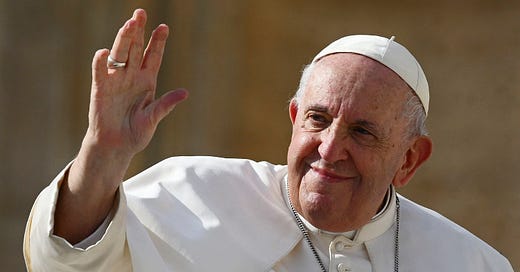



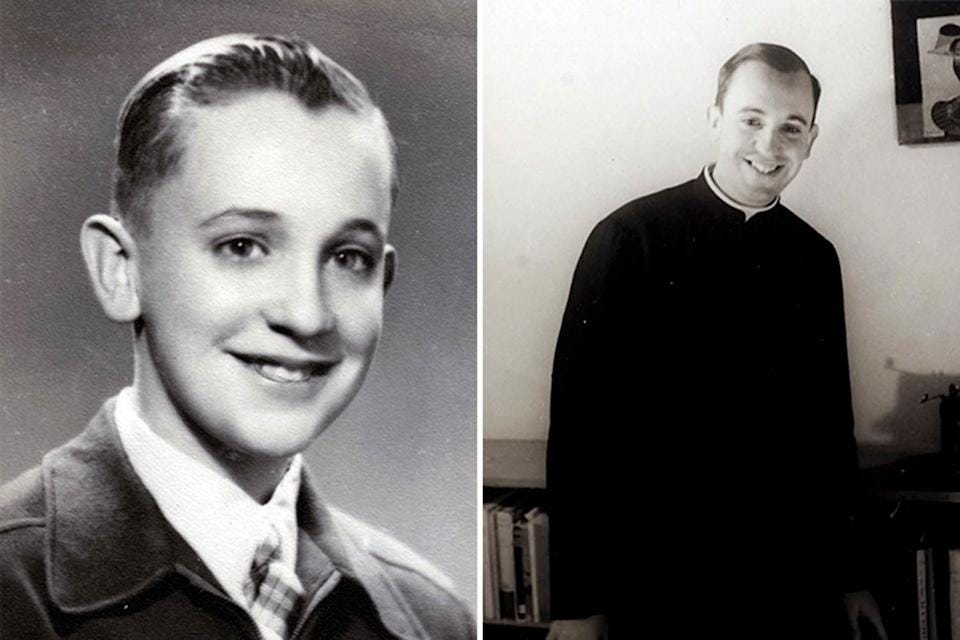
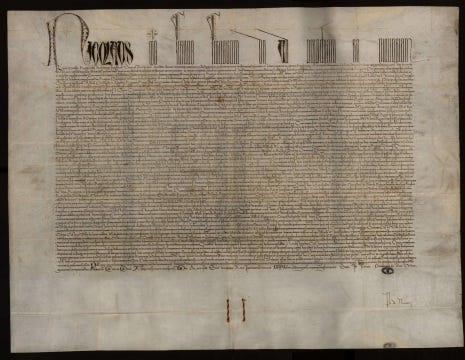
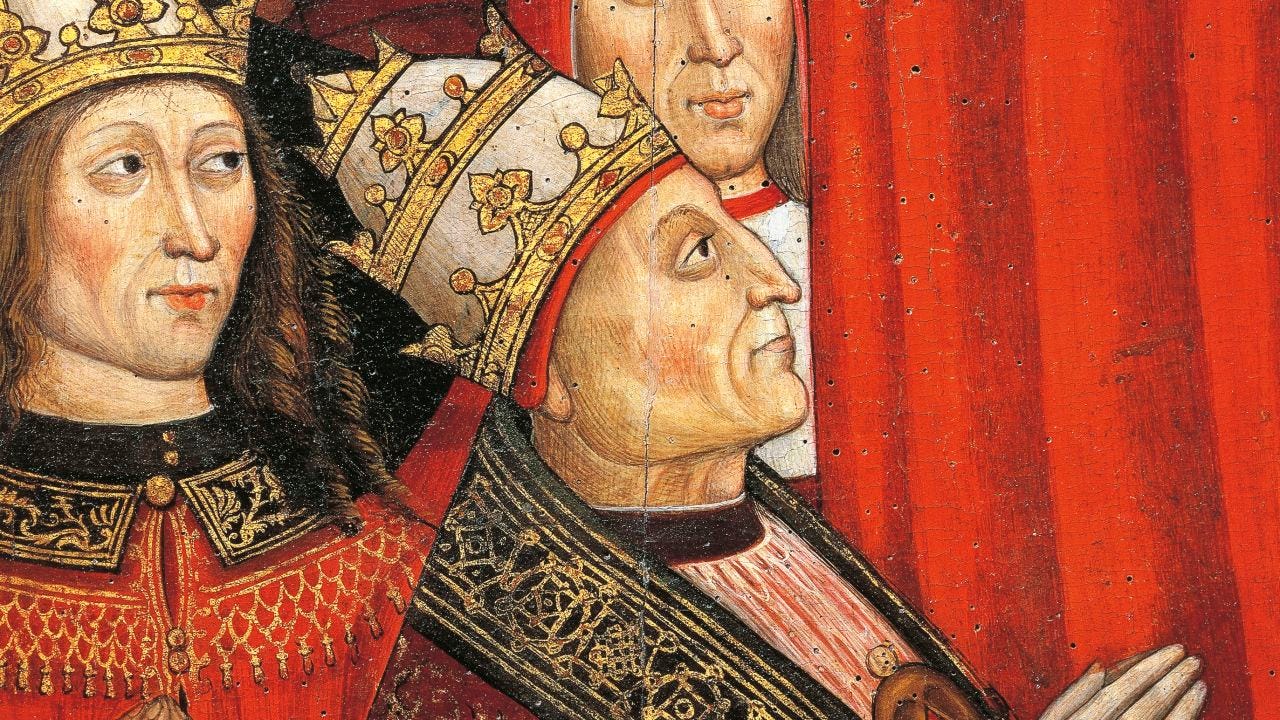
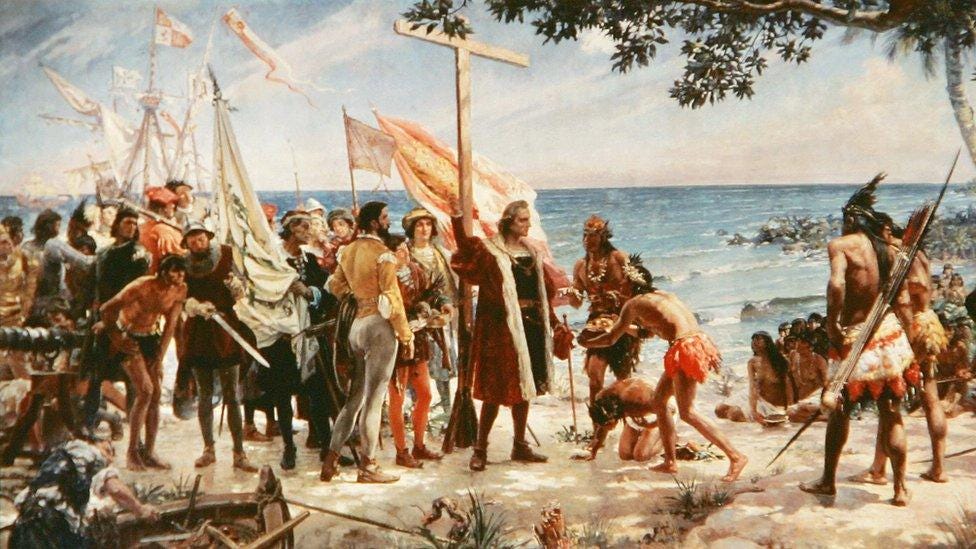
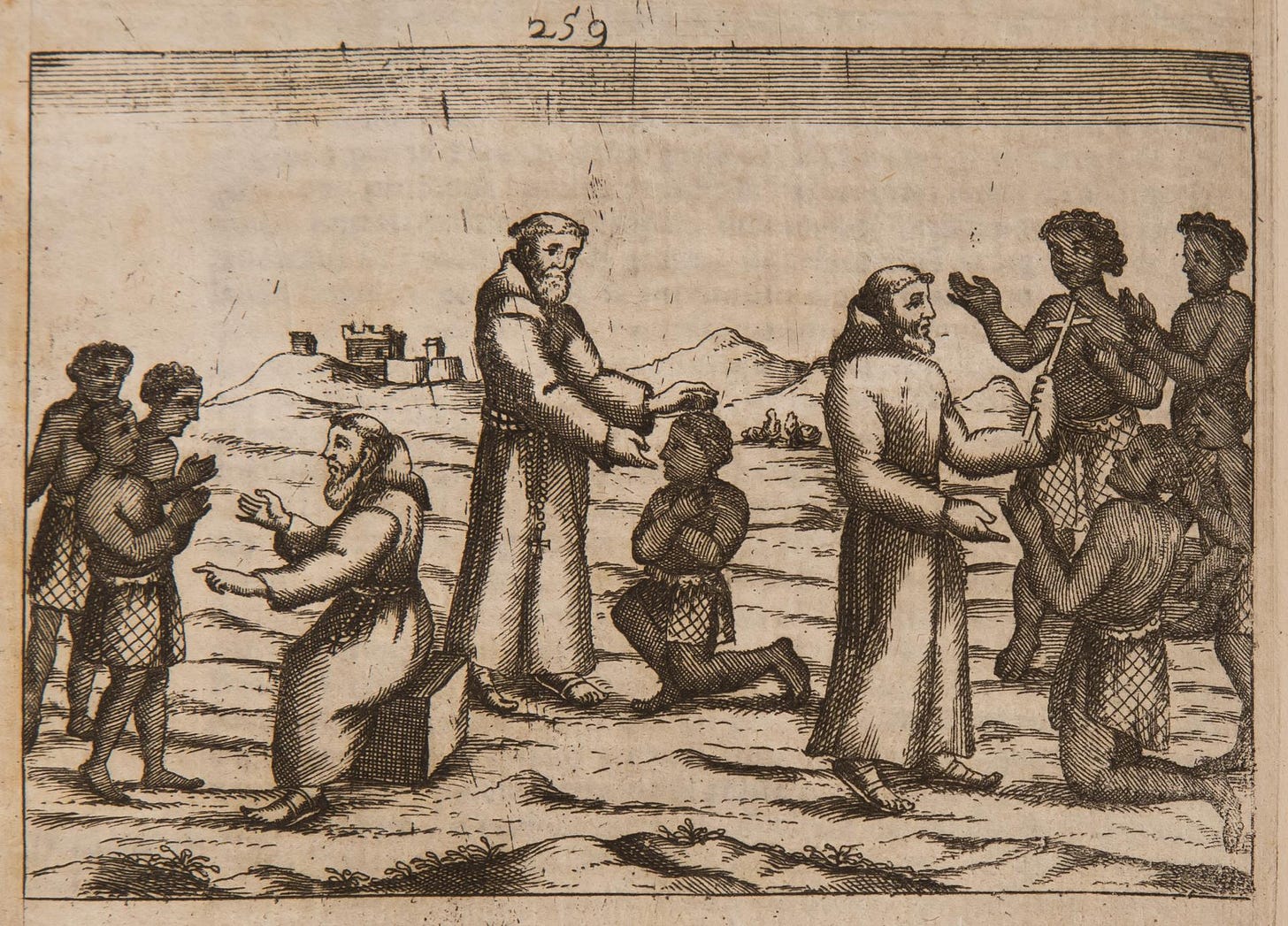
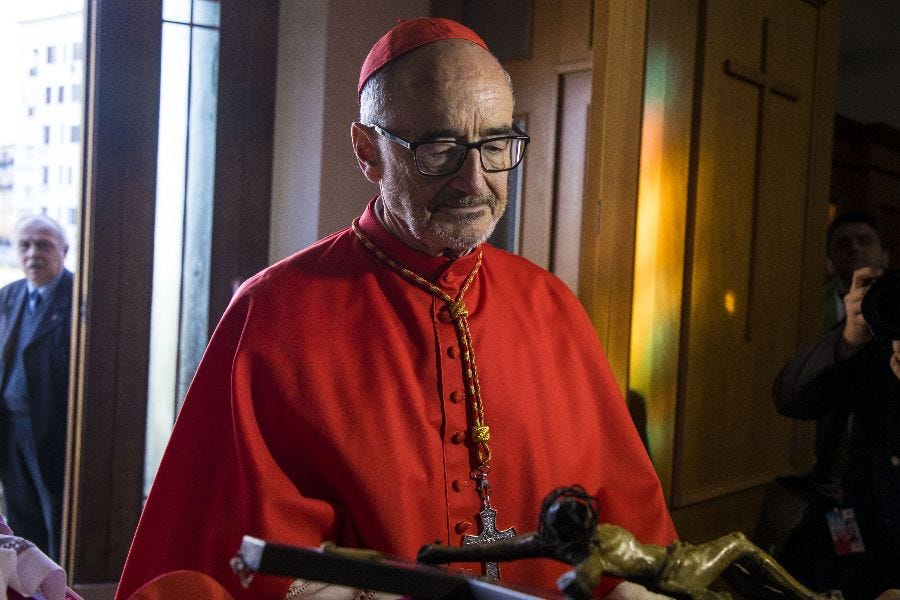
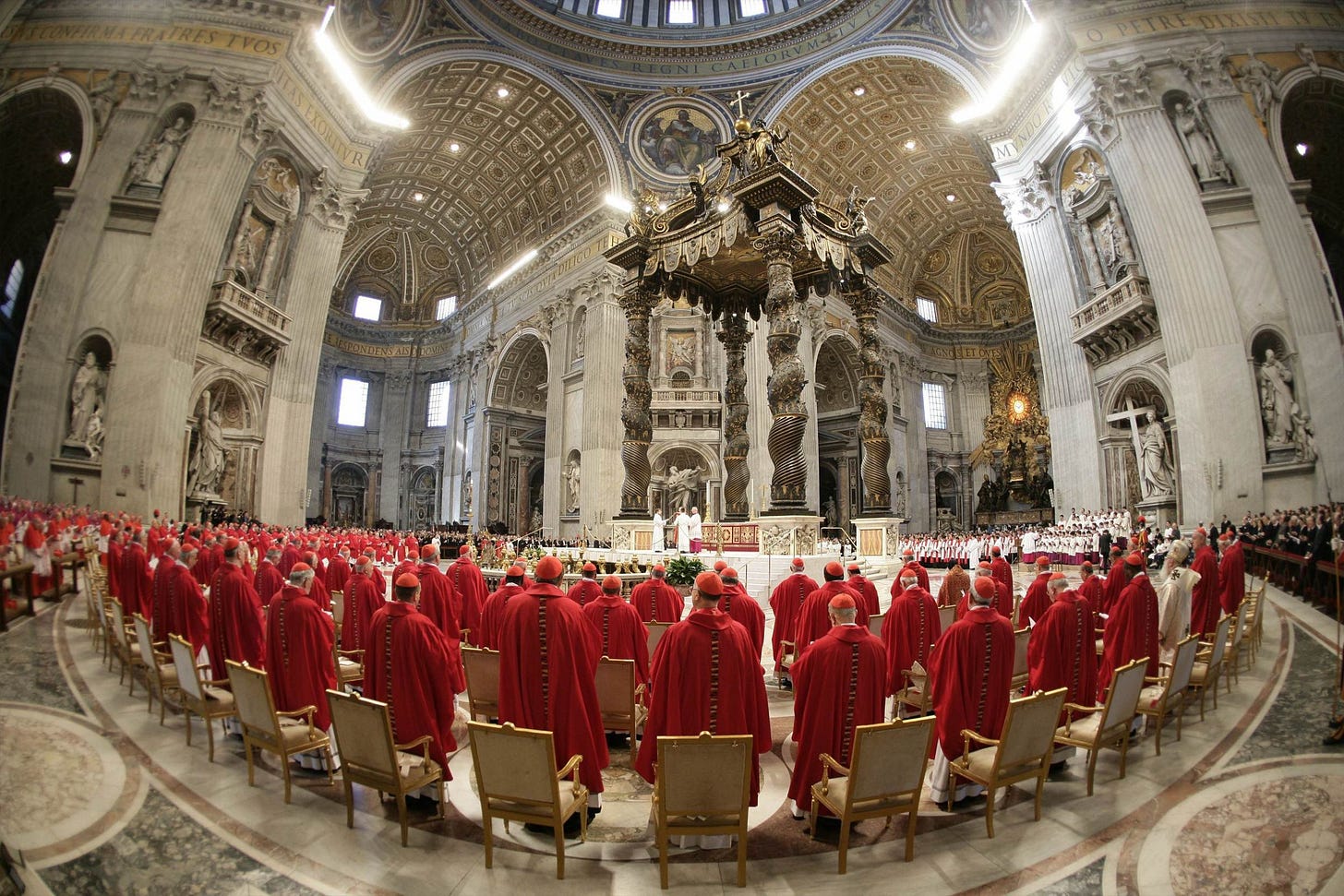
Thorough read! I did not know all of this about Pope Francis. I agree with you that his efforts were half hearted, however, they were more than we've seen in times past. I'd hope that he led by example and influenced others coming after him to consider filling in the gaps. Unfortunately, there's not much trust left in hoping for someone to come right the wrongs of our past.
I am concerned that the Catholic Church will veer much more than Pope Francis was and it will only encourage more abuse of human rights.
Thank you for this. I doubt most if any practicing Catholics understand this history and how it impacts current law.
“By the Fire We Carry” by Rebecca Nagle discusses the Supreme Court’s decision you mention above. I highly recommend it.